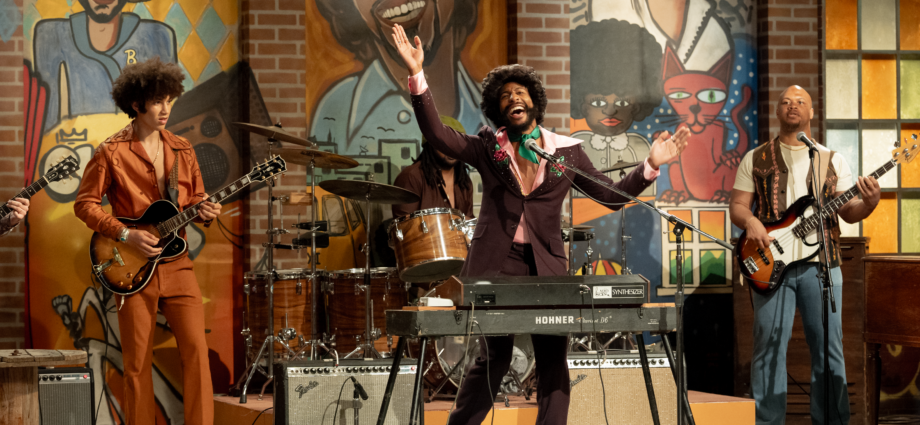“Saturday Night” director Jason Reitman didn’t want a score that paid homage to “Saturday Night Live.” Musician Jon Batiste says, “He wanted a pressure cooker of a score, and I interpreted that to mean that he wanted me to do an anti-score.”
“Saturday Night” follows a tense 90 minutes on October 11, 1975, as Lorne Michaels and a group of young comedians and writers prepare for the first broadcast and premiere of “Saturday Night Live.”
Batiste is doing double duty in Jason Reitman’s “Saturday Night,” he’s playing musician and band leader Billy Preston, and he also composed the film’s score.
Popular on Variety
The “anti-score” directive was heaven for Batiste who loved that type of score because it breaks with the paradigm. The narrative is set within a 90-minute timespan. “The villain of the film is the clock,” says Batiste. “The music is an allegory for the ticking of, and pressure of time.”
Batiste used the score to heighten the emotion and lean into the nostalgia, but he also needed to consider sound effects, score and dialogue. “It’s not typical, it’s unorthodox,” Batiste explains. “At certain moments the score becomes sound design. In other moments, the score or the sound effects are louder than the dialog. Sometimes they’re telling the story. Sometimes the dialog is happening and there’s this brooding percussion underneath it that’s not quite score or sound design, it’s something else.”
The opportunity to have one single-string instrument versus an orchestra was also a tribute to vaudeville and the entertainer Jack Benny. “I see ‘SNL’ as the pinnacle of variety, of vaudeville. It’s like a subtle nod to that without having an orchestra,” Batiste says.
To build the tension of the clock ticking, Batiste thought hard about what instruments would push that. Percussion came to mind with a fiddle blended in a percussive way, a horn section, and a tap dance blended into the score. “These are all instruments that both are the backdrop of New York in terms of the cultural milieu. It’s the type of ‘SNL’ house band sound. It’s the type of percussion and sound design that you would hear in some of the early types of films, reminiscent of the vaudeville era. So I was blending all those elements to create the clock but a very unique bespoke clock to this ‘SNL’ experience.”
Batiste explains his vision, along with Reitman’s was to have the music become a character in the film. “It’s not just something that happens to heighten the emotion of a moment, scene, or theme for a character, it was an actual character that’s moving the narrative forward.”
In portraying Preston, Batiste had access to tapes, but there wasn’t a lot of information behind the scenes. “It was just a lot of info about what we saw as an audience, and the rest was first-hand accounts from folks on the cast who we spoke to and Jason, who had done a ton of research and shared it with us.”
Preston was a big influence on the score. Says Batiste, “I was carrying his spirit into the recording and the composition. So there was a lot of influence that’s not so direct musically, but it’s more like a patron saint of the score, somebody who’s watching over us.”
As for separating the two, Batiste says he didn’t. “I loved being immersed in the process and not separating them in a way that I could even dictate being on the set, creating, acting, composing and recording all at once.” He continues, “It gave everything that we did this real sense of presence. It all felt like it was happening in real time in the same room because it was and that’s something you can’t replace.”

